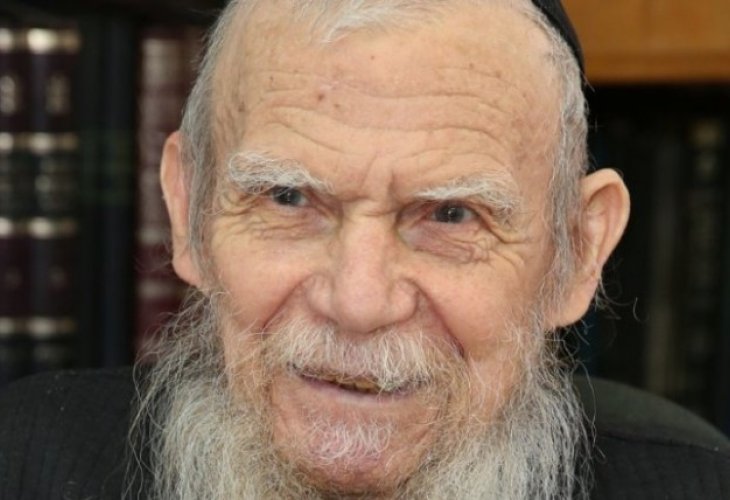Facts in Judaism
Planting Faith at Home: Rabbi Gershon Edelstein's Timeless Lessons in Jewish Education
How Everyday Moments in the Jewish Home Build Generations of Torah, Prayer, and Emunah
 Rosh Yeshiva of Ponevezh, Rabbi Gershon Edelstein (Photo: Yaakov Cohen/Flash90)
Rosh Yeshiva of Ponevezh, Rabbi Gershon Edelstein (Photo: Yaakov Cohen/Flash90)In the sacred tapestry of Jewish life, it's often the quiet, unseen acts that leave the most lasting impact. The late Rabbi Gershon Edelstein, the revered Rosh Yeshiva of Ponevezh and spiritual leader of the Hareidi world in Israel, taught that one does not need a pulpit or platform to influence generations. The home, he said, is the true foundation of Jewish education—and every parent, teacher, and grandparent is a builder of souls.
In his teachings, featured in the Ways of Education publication, Rabbi Edelstein emphasized that caring for one’s family is not merely an obligation; it's a powerful mitzvah. Providing for a spouse, children, or any household member is a form of daily kindness that accrues immense spiritual merit. But his insight went even deeper: every Jewish home is also a center of spiritual influence, where the seeds of Torah and emunah (faith) are sown with love.
From the earliest moments of a child’s life, parents begin planting these seeds. Even before a child understands words, they are taught holy expressions - “Modeh Ani,” (The "I am thankful" prayer recited upon rising each day) and “Shema Yisrael." These phrases, simple as they may seem, begin to mold a child’s consciousness. The tone of speech in the home matters too. Instead of saying “I will do” or “I will go,” Rabbi Edelstein urged families to speak with the language of faith: “Im yirtzeh Hashem” (God willing), “B’ezrat Hashem” (with God’s help). This language nurtures an inner world where Divine providence is felt and trusted.
In earlier generations, it was common to speak openly with even young children about spiritual reward and consequence. This wasn’t seen as frightening or harsh, but rather as essential education in yirat shamayim (the awe of Heaven). When balanced with the beauty and joy of Torah, these teachings shaped a wholesome spiritual worldview. Rabbi Edelstein emphasized that such conversations didn’t cause sadness, but inspired clarity and reverence.
Educators also hold tremendous influence. A kindergarten teacher, for example, does more than supervise children. Through daily routines—reciting “Modeh Ani,” singing “Shema,” discussing the Creator and the wonders of the world—she inspires faith in her young charges. This is true spiritual leadership. Even greater, he taught, is the impact of elementary school teachers who give children a living experience of Torah and emunah that accompanies them for life.
And the influence doesn’t stop with teachers and parents. Grandparents, too, shape the spiritual identity of their grandchildren. Telling stories about the revelation at Sinai and the holiness of the festivals plants lasting impressions. When children hear that on Rosh Hashanah we are judged, that Yom Kippur is a day of atonement, or that the Ten Commandments were heard directly from Hashem, they inherit a sense of sacred history and Divine connection.
Shabbat, too, is an opportunity for joyful education. Rather than presenting it as a day filled with restrictions, Rabbi Edelstein urged parents to portray it as a day of light, song, delicious meals, and Torah. When a child sees Shabbat as a gift, a delight, their soul absorbs that joy. The Talmud even says that people's faces change on Shabbat—and indeed, the holiness of the day can be seen in the very glow of those who honor it.

Even small rituals in the home reflect deep faith. A simple charity box where coins are regularly deposited, a mother lighting Shabbat candles with tears and a heartfelt prayer for her children’s Torah growth—these are moments of profound spiritual power. When a new baby is born, the very first blessing we shower upon the newborn is, “May they be raised to Torah, to chuppah, and to good deeds.” This, too, is an expression of unwavering belief in a Torah future.
Rabbi Edelstein often reflected on personal stories of faith, recalling the difficulty of leaving Soviet Russia. His uncle, Rabbi Binyamin Movshovitz, spent years praying to be allowed to emigrate to the Holy Land. Against all odds, he was granted an exit permit and the resources to travel. It was not merely a miracle—it was the result of persistent, heartfelt prayer. Rabbi Edelstein taught that prayer is not supernatural—it is natural. It is the tool that opens doors that nothing else can.
And nowhere is this more apparent than in Torah study. Without prayer, true success in Torah is impossible. Our prayers are filled with supplications for Torah knowledge and clarity. We ask Hashem to grant us a portion in His Torah because, without it, a person is spiritually vulnerable. Rabbi Edelstein echoed the words of the Chazon Ish, who insisted that Torah success often comes not from talent, but from tears—perhaps the tears of a mother or grandmother lighting Shabbat candles with trembling lips and heartfelt cries.
Rabbi Edelstein’s message is clear and empowering: Every Jewish home, no matter how modest, can be a mikdash me’at (a miniature sanctuary). Every parent, grandparent, and educator builds faith, sows Torah, and transmits the Divine light. It does not take grand gestures. It takes words of kindness, acts of love, the language of emunah, and, above all, sincere prayer.
May we all merit to educate with wisdom, to speak with faith, and to raise generations who live with Torah in their hearts and emunah on their lips.

